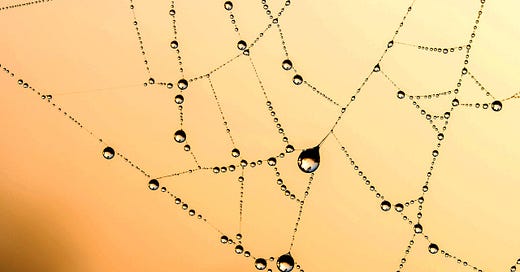You don't suck, your society is just failing you
How the spiderweb theory of success can make you a little less hard on yourself
For the first three years of the COVID-19 pandemic, I was working at a library. By the time I left, all of the library workers were in a state of more or less constant stress. We’d had to deal with patron overdoses, with verbal, physical, and sexual assault on the premises, we had to deal with fascists screaming at us for teaching kids that gay people exist, we had to deal with unreliable funding and spotty, unimpressive support from our state and local government, and how our own crumbling mental health impacted our working dynamic.
It was easy, in those moments, to feel like things were falling apart because we weren’t doing a good job. It was easy to blame each other or ourselves for things that went wrong, because, after all, we were the people in the library. We were the ones making it run. How could the library’s failings not be a result of our own failings?
I felt awful for my my part in the failure to keep the library’s head above water until one day when patrons came in asking for help accessing their state benefits. During the pandemic, many benefits shifted from being distributed through the mail or in-person to being distributed online. This was a huge problem, because generally speaking, the people who need benefits — the elderly, the poor, the marginalized, the disabled, the homeless — are the least online.
So we scrambled to put together a “digital literacy lab,” where we spent all day every day teaching people how to use computers, how to create email accounts, how to go through complicated “identity verification” schemes which forced people who didn’t have FaceTime to FaceTime with a state representative to prove that it wasn’t someone else accessing their benefits fraudulently.
Our mandate was to teach people how to use computers — we were librarians, not social workers, so we couldn’t handle sensitive information like Social Security Numbers — but many people had no interest in learning something new, because they just wanted to pay their rent, or eat some food. So we’d spend some time helping them set stuff up, and then we’d send them to our State Senator’s constituent services office if they needed any more help.
Until one day, when patrons we previously helped and had sent on their way, came in and told us: the Senator’s people wouldn’t help them, and instead had said, “Go back to the library, they’ll take care of it.”
This, aside of being a fairly horrific abnegation of duty by a “progressive” elected official, put us in a difficult legal situation: if we helped the patrons, we were exposing ourselves legally by handling private information. If we didn’t, they could lose their homes.
And suddenly it clicked: I’m not failing. This system is failing. It is unapologetically failing — with its terrible drug policies that led to the opioid epidemic, with its awful healthcare system that led to a widespread mental health crisis, because of its labyrinthine benefits regime that does everything it can to keep people in need from accessing assistance, because of its atrocious public health infrastructure that allowed a million Americans to die from a pandemic and millions more to suffer horrifically in the ensuing economic meltdown — and I somehow have the gall to blame myself for its failures.
The sin of internalizing chaos
Once this realization hit me, about a dozen others followed. The big one was with parenting: In the early pandemic, I felt like I was failing my kids by not being present enough, by getting overwhelmed by them, by zoning out on my phone, by not cooking enough fresh meals, by losing my temper. It wasn’t the kids fault — we had a two bedroom apartment with two adults who were working full-time, the parks had closed, the daycares had closed, and we couldn’t get childcare from family without risking exposure to the virus.
But while this wasn’t my kids fault, a lot of it wasn’t our fault. I think, for the most part, that my wife and I did our best, and that we were trying to cobble survival together out of an impossible situation. That situation wasn’t even sort of our own creation.
This phenomenon seemed to be rampant: my teacher friends kicked themselves for failing their students (which they weren’t), my medical friends wondered if they were doing enough for their patients (they were), my activist friends wondered if they were doing enough to affect change (they were), and so on.
We all felt like failures not because we weren’t trying hard enough, but because our system was garbage, and it was failing us. It was easier to blame ourselves than blame our government and our economy. It was like the stories you’d hear after the 2007 recession where people who had worked in factories for decades would get laid off because of the economic crisis (combined with mismanagement and corporate greed) and they’d blame themselves for what had happened to them.
There’s something very human about this — when something terrible happens to us, we tend to try and figure out what we could have done differently, even if what happened was largely out of our control. Would it not be better to admit what’s in our control and what’s not?
Personal responsibility vs. The Web
The conservative argument is always that instead of blaming systems, we should take personal responsibility for our actions, take control of our lives. This only really makes sense from an individualist perspective: if you believe every man is an island, that the individual is the only unit that matters, sure! Why wouldn’t you just take control instead of moping?
On its face, this sort of ethos is empowering, because it just says keep working, and you’ll get there, anyone can do it, even you. That is, fundamentally, the American Dream, and there’s a reason why so many people live by it.
The problem is when personal responsibility is the only factor we consider in why our lives are the way they are. The famed social theorist Murray Bookchin pointed out the flaws to the “we just need to make better choices” idea in an interview:
Interviewer: Choice, not circumstance, leads to human success.
Bookchin: Choice? That may be true for those where all the circumstances give them the opportunity to make choices. There are endless choices that I’d like to follow through on but I can’t make. For example I’d like to take long walks and I can’t. I got arthritis.
The conservative (and more broadly, American) individualist viewpoint denies a fundamental fact of life, which is that humans are part of systems, and we are constrained by those systems regularly. It may help to picture yourself as a locus in a web — a spot where many different threads intersect.
Try something, the next time you see a spider web: with a toothpick or something small, try and move one of those loci around a bit. If you move it up, the threads beneath the intersection will grow taut, pulling other loci with it. Some of the threads may even break. The threads above the intersection, however, will loosen. The movement of one locus influences all of the other loci around it.
One of the things I’ve noticed in many immigrant stories of the American Dream is that the dream is often reserved for the second generation. The parents who arrive in the country penniless often spend their entire lives working menial jobs so that their kids could get access to better education, and thus could become what they dreamed of becoming. The parents, in the web understanding, are giving their kids the slack to move in the direction they want to.
This is a healthier understanding of success, because it recognizes that the people who made it often did so on the backs of an entire community who committed to helping them make it — teachers who dedicated time and effort, friends and family who offered money and time and knowledge, coaches who gave them late nights, siblings who took on burdens that the “successful” kid didn’t have time for, etc. When one thread slackens, another one, somewhere, must tighten.
What we have right now is a system in which a lot of threads have tightened so a very few threads have the freedom to do whatsoever they please. This web does not apply just to humans, it applies to entire ecosystems: we have, for example, collectively decided we like being outside only when there are no insects. So we make our yards into barren lawns, which we then coat with pesticides. All of the local environment pays because of our desire for that one piddling freedom we decided to impose on it.
Surviving in the web
All of which is to say — stop blaming yourself for the position you occupy in the web. Does it feel like every thread is tight right now? Like you are constrained on all sides? Does it feel like the rare moments of free time you get are moments you would like to spend asleep?
Guess what? You’re not to blame! You’re allowed to just admit you have it hard at the moment, and that the failures you’re experiencing are failures of an entire system that has left you out to dry so a few people — people you probably wouldn’t like — can have all the freedom you long for. Accept that, stop being hard on yourself, and get some rest.
The good news is that we can create a bit more slack for the rest of us, just by building a few more threads.










